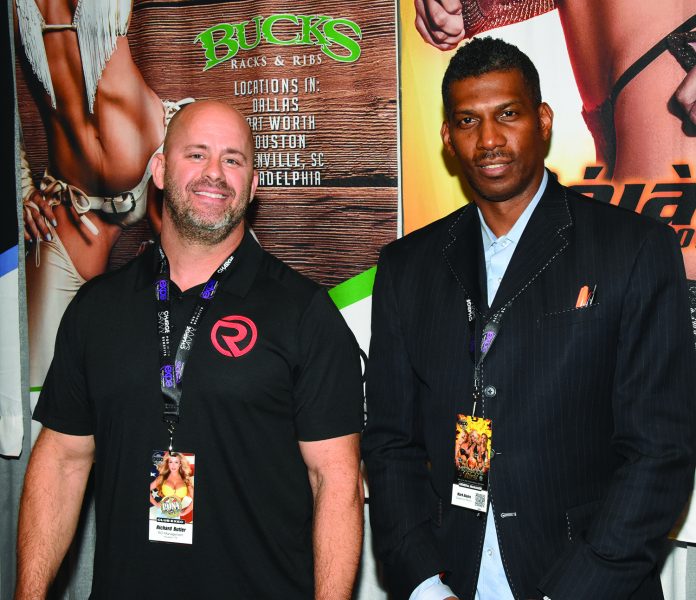(Note: This story appears in the September 2022 issue of ED Magazine)
Theft and waste are brutal realities of the bar business, but Spearmint Rhino’s Mark Alums and RCI’s Richard Butler — two very experienced bar management veterans — were on hand to offer tips to proactively combat sticky-fingered or incompetent bar staff.
The truth of the matter is this: your club may very well be a den of thieves. Honest thieves, but thieves nonetheless.
That’s because, according to the National Restaurant Association, 75% of employees steal from the workplace at least once and employees are likewise responsible for 75% of inventory shortages.
Doesn’t mean all these employees are being malicious — more like oblivious.
That was the focus of the Bar Management “Preventing Theft and Waste” Certification at EXPO. Richard Butler, now a regional manager with RCI Rick’s Cabaret, said he unknowingly committed the same crime.
“I bartended for a very short period of time and I was stealing from the bar,” said Butler. “I had no idea. I think that happens a lot.”
Butler came from a hosting background and he felt the same responsibility as a bartender, to “take care of people,” whether that was a bit of a stronger drink or a freebie. Part of the problem? Butler never received proper training on how to bartend, which translated into unintentional theft.
“It wasn’t until I got into management much later, that I realized how much money I was costing that bar,” Butler said, who pointed out how chances are it’s more than one bartender at an establishment doing the same thing which compounds the problem.
“(Clubs) need to let (bartenders) know why we do certain things, why we make policies, why we put these protocols in place,” he said.

Mark Alums, bar manager for Spearmint Rhino Vegas and a 35-year veteran of the nightclub and adult club industries, related a story where he found a bartender of his was adding $5-10 to his credit card tabs at night which totaled out to $2,000 a month.
“A lot of times, people don’t pay attention to a couple of dollars,” he said. “It doesn’t look like a big deal, but it is still a big deal. You can slowly milk the place that you’re working from at just a couple of dollars at a time.”
Butler defined theft as anything not rang in properly, over pouring, spillage or compensated drinks. The problem, he said, is that sometimes clubs don’t properly document all the activity that goes on at the bar.
“You cannot really judge what your bar is doing unless you’re documenting everything that’s going across your bar, a spill, a comp, anything,” he said.
Alums reiterated that theft occurs — intentionally or not — because clubs aren’t accounting for everything.
One of the first places to possibly spot trouble is in the interviewing process. Butler said it’s not necessarily about trying to catch people stealing, but to be transparent in the way the club operates.
“We’re trying to keep people honest,” Butler said. “We’re trying to prevent (theft). Last thing we want to do is catch one of your bartenders that have been working there a long time stealing and then you lose that bartender, which can lead to a loss of guests.”
Alums said it’s not that simple, however.
“I’ve had some incredible interviews and shitty employees,” he said, adding he likes to pop quiz interviewee candidates to see if their experience matches their resume. “Everybody’s going to have a good resume when they come to you.”
Vetting candidates is crucial because while theft is a problem you want to avoid, it’s a different loss of resources to hire, train and subsequently fire someone because they weren’t qualified in the first place.
When asked what effective tools or policies Butler and Alums utilize to deter bar theft, some answers included careful documentation of what’s being compensated or spilled, as well as video audits and specific training.
“Let them know you’re looking, let them know that you’re watching,” said Butler. “That’s one of the most important things is to be consistent with it. Be fair about it and do it to everybody — treat them with respect.”
“We’re trying to keep people honest. We’re trying to prevent (theft). Last thing we want to do is catch one of your bartenders that have been working there a long time stealing and then you lose that bartender, which can lead to a loss of guests.” — Richard Butler
Alums believes there has to be a fine line between boss and friend. Sharing a beer or conversation may erroneously lead some bartenders to skirt the line when it comes to their work, such as incrementally over-pouring.
“Being friendly is different than being friends,” he said. “An employee has to understand that.”
One thing to keep in mind is Alums and Butler come from large, high-volume institutions which differ from “mom and pop” clubs. Alums suggested that at a high-volume bar, spills are a major source of theft/waste vs. a mom-and-pop establishment, which has a high number of regulars leading to free drinks to maintain relations.

Butler maintained inadequate training is the real culprit for theft/loss. Of course, bartenders are only one aspect of a bar and bar theft. While over pouring, spills, free drinks can all contribute to financial losses, another potential area of weakness is inventory mismanagement.
Alums said his club weighs every bottle to ensure uniformity.
“We put the bar in place, this is how you — the bartender — adjust,” he said. “We have thousands of bottles — every single one has a home, has a place, and has a name. You let a bartender dictate how he wants to run your bar, you’re already losing. You guys dictate how a bartender is going to work for you and for the system in place.”
In addition to cutting down on theft and inventory waste, that system helps the bartender because it ensures business will flourish and that bartender has a job.
“If you’re having a problem with inventory, don’t wait to the end the month to do it, do it weekly,” advised Butler. “I know a lot of clubs that do that already and they have a lot less problems, doing weekly inventory.”
“We have thousands of bottles — every single one has a home, has a place, and has a name. You let a bartender dictate how he wants to run your bar, you’re already losing.” — Mark Alums
The seminar closed out with each Butler and Alums sharing five tips attendees could take away and implement immediately upon returning from EXPO.
Alums:
• Pour test
• Product test
• Create a procedure
• Spot checks
• Management-approved compensations
Butler:
• Compensation/spill sheet • Product test
• Jiggers
• Weekly audits
• Video audits
“I’m a firm believer in how you treat your staff,” said Butler. “If you treat them bad, they’re going to steal from you every chance they get. If you treat them good, get them on your side — you still have to manage them — but you’re going to get less theft if they believe they’re on your team.”
Alums pointed out how some people steal because they feel they’re making meager money compared to the establishment itself.
“People feel entitled, they feel they should get a bigger piece of that pie,” he said.





























